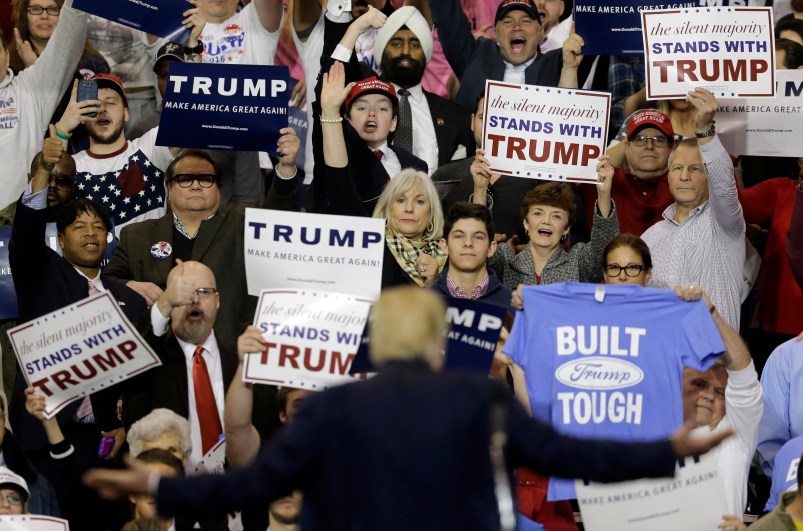No, I’m not back from vacation. But I wanted to share a thought with you. (We’ll see how writing a post on an iPad goes.) I’ve mentioned in several contexts over the last few months how our nominating processes – on both sides – are actually extremely rickety and dysfunctional processes that are entirely unable to withstand the stresses of nominating a presidential candidate without a party that is fundamentally united.
Yes, there are always divisions. Your faction lost, yours won. Your candidate did or didn’t make it. Blah blah blah. But in the modern nominating system, which not coincidentally goes back to the post-1968 period, you haven’t had a fundamentally divided party. Right now, the GOP is fundamentally divided. And it’s bringing out all these uncaulked leaks in the edifice which were known in a way but just never really thought through until now.
I’ve mentioned a couple times that what most people never really thought through was that the clinch before the convention model was always based on fundamental party unity. A candidate didn’t win by winning. He or she won when they demonstrated that no other rival could win. After that, the money dried up for the also rans and they were ushered out of the race. This just wasn’t obvious before because we’d never seen this system operate under these different conditions.
Now we’re seeing another case of this. I certainly knew that election night was not the end of the delegation selection process in most states – especially in caucus states. But I confess I did not realize how many states do not allow a candidate any direct control over who ‘their’ delegates even are. So Donald Trump could win all the delegates in a particular state but have party functionaries pick the actual people who will serve as ‘Trump’s’ delegates. So they’re bound on the first ballot but actually there to support Cruz or Kasich or some other unicorn candidate.
Now, shame on Donald Trump – supposedly great leader and organizational genius – for apparently not knowing about this until last week. Sure, I wasn’t up on all the rules either. But I’m not running a presidential campaign!
I think many people imagine a raucous and wild scene where the Trump delegates walk out of the hall after the convention gives Mitt Romney or maybe Jeb Bush’s son ‘P.’ the nomination. But in fact there may be no Trump supporters there to walk out. Now, obviously there will be some. But maybe not that many. And the ‘Trump delegates’ who agree to vote for someone else on the second ballot may not be former Trump supporters. They may be Cruz supporters or just party regulars. In fact, Trump delegates who aren’t genuine Trump supporters will likely be diehard anti-Trumpers because someone else will have had to have worked really hard to get them there and they won’t have left anything to chance.
Don’t get me wrong. Couldn’t happen to a nicer guy or a nicer party. But this is no way to run things.
In a sense we’ve seen this before. And quite recently. The 2000 election exposed a series of potentially catastrophic flaws in the presidential election system that just needed a special set of circumstances to be brought to light. All of this is why this is bounding toward a wildly destructive conflagration in Cleveland. Elections of all sorts rest not fundamentally on rules and bylaws but on legitimacy. An RNC national committeeman recently complained that the press had given people the wrong impression that voters decided who the nominee was rather than the party. By the rules, he may be right. But good luck sailing that ship across any body of water.
Over half a century, the national primary process has been enshrined as a national election process. It may be run by party rules and may have all sorts of obscure and nonsensical bylaws. But you vote in the same precinct station as you vote in real elections. For real people that means it’s an election, period. You vote and your vote is supposed to count. Break that understanding and there will be hell to pay. Whatever rules you can cite simply are not going to matter that much.
TPM Readers know, because it’s been one of the site’s core perennial issues for 15 years, that people’s right to their vote gets disregarded all the time. But it is by definition almost always the votes of the marginalized and those lacking power, almost always those most loosely tied to the political system. And usually it either does not or cannot be proven to swing an actual election. It is quite another thing, under the bright lights of intense national press scrutiny to take the win away from the guy who unambiguously won the most votes.
Of course, there’s another explosive element in the mix. You’re not just talking about taking this away from anyone. Trump’s constituency is the part of the electorate which Republican politicians have been marinating in grievance and betrayal politics for decades. It’s a tangible confirmation of every betrayal, wrong and loss since Santa was killed in the first battle of the War on Christmas. Only it’s not coming from Al Sharpton or Hollywood elites or limousine liberals or Feminazis. It will be coming from their supposed protectors, their party.
It won’t go down well. There will be hell to pay.






